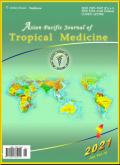Antibiotic resistance and molecular typing of clinical Staphylococcus aureus isolates from Malaysian military hospital
IF 1.6
4区 医学
Q3 PUBLIC, ENVIRONMENTAL & OCCUPATIONAL HEALTH
引用次数: 1
Abstract
Objective: To determine the antibiotic resistance profile (ARP) of Staphylococcus (S.) aureus isolates and molecular typing of the methicillin-resistant S. aureus (MRSA) isolates from Tuanku Mizan Armed Forces Hospital (TMAFH), Kuala Lumpur. Methods: The ARP and presence of the pvl gene were determined for 209 S. aureus isolates from clinical specimens. Of these, 123 were methicillin-susceptible S. aureus (MSSA) isolates and 86 were MRSA isolates. All MRSA isolates were characterized using SCCmec typing and spa typing. Descriptive analysis was performed to compare the demographic data with the phenotypic and genotypic variables of the S. aureus isolates. Results: No vancomycin-intermediate and -resistant S. aureus (VISA and VRSA, respectively) were detected among the study isolates. The MSSA isolates showed low resistance rates to all tested antibiotics, were commonly invasive (28/42, 66.7%), and mostly harboured pvl (35/42, 83.3%). Meanwhile, MRSA isolates showed high resistance to penicillin (86/86, 100%), ampicillin (86/86, 100%), sulbactam/ampicillin (86/86, 100%), cefuroxime (81/86, 94.19%), cefoperazone (76/86, 88.37%), azithromycin (56/86, 65.12%), and erythromycin (54/86, 62.79%). The majority of MRSA isolates were of SCCmec type IVh (65/86, 75.58%), spa type t032 (55/85, 63.95%), and grouped into spaCC-t022 (66/85, 77.65%). The t032 type was found to be associated with resistance traits to azithromycin and erythromycin (P<0.05). We also found several spa types that are typically associated with hospital-, community-, and livestock-associated MRSA co-existing in our MRSA population. Conclusions: This study reflected the consistent absence of VISA and VRSA and corroborated the clonal shifting of MRSA isolates in the Malaysian MRSA isolates.马来西亚军队医院临床分离金黄色葡萄球菌的耐药性和分子分型
目的:测定吉隆坡Tuanku Mizan武装部队医院(TMAFH)分离的金黄色葡萄球菌(S.)的抗生素耐药性谱(ARP)和耐甲氧西林金黄色葡萄菌(MRSA)的分子分型。方法:对209株临床分离的金黄色葡萄球菌进行ARP和pvl基因检测。其中123株为甲氧西林敏感金黄色葡萄球菌(MSSA)分离株,86株为MRSA分离株。所有MRSA分离株均采用SCCmec分型和spa分型进行鉴定。进行描述性分析,将人口统计学数据与金黄色葡萄球菌分离株的表型和基因型变量进行比较。结果:在研究分离株中未检测到万古霉素中间体和耐药金黄色葡萄球菌(分别为VISA和VRSA)。MSSA分离株对所有测试的抗生素均表现出较低的耐药性,通常具有侵袭性(28/42,66.7%),并且大多携带pvl(35/42,83.3%)。同时,MRSA分离株表现出对青霉素(86/86,100%)、氨苄青霉素(86-86,100%),和红霉素(54/86,62.79%)。大多数MRSA分离株为SCCmec IVh型(65/86,75.58%)、spa t032型(55/85,63.95%),分为spaCC-t022型(66/85,77.65%)。t032型与阿奇霉素和红霉素的耐药性特征有关(P<0.05),以及在我们的MRSA人群中共同存在的牲畜相关MRSA。结论:本研究反映了VISA和VRSA的一致缺失,并证实了MRSA分离株在马来西亚MRSA分离物中的克隆转移。
本文章由计算机程序翻译,如有差异,请以英文原文为准。
求助全文
约1分钟内获得全文
求助全文
来源期刊

Asian Pacific journal of tropical medicine
PUBLIC, ENVIRONMENTAL & OCCUPATIONAL HEALTH-TROPICAL MEDICINE
CiteScore
4.00
自引率
9.70%
发文量
1936
审稿时长
3-8 weeks
期刊介绍:
Asian Pacific Journal of Tropical Medicine (ISSN 1995-7645 CODEN: APJTB6), a publication of Editorial office of Hainan Medical University,is a peer-reviewed print + online Monthly journal. The journal''s full text is available online at http://www.apjtm.org/. The journal allows free access (Open Access) to its contents and permits authors to self-archive final accepted version of the articles on any OAI-compliant institutional / subject-based repository.
APJTM aims to provide an academic communicating platform for international physicians, medical scientists, allied health scientists and public health workers, especially those of the Asia-Pacific region and worldwide on tropical medicine, infectious diseases and public health, and to meet the growing challenges of understanding, preventing and controlling the dramatic global emergence and re-emergence of infectious diseases in the Asia-Pacific.
The journal is proud to have an international and diverse editorial board that will assist and facilitate the publication of articles that reflect a global view on tropical medicine, infectious diseases and public health, as well as emphasizing our focus on supporting the needs of public health practitioners. The APJTM will allow us to seek opportunities to work with others who share our aim, and to enhance our work through partnership, and to uphold the standards of our profession and contribute to its advancement.
 求助内容:
求助内容: 应助结果提醒方式:
应助结果提醒方式:


